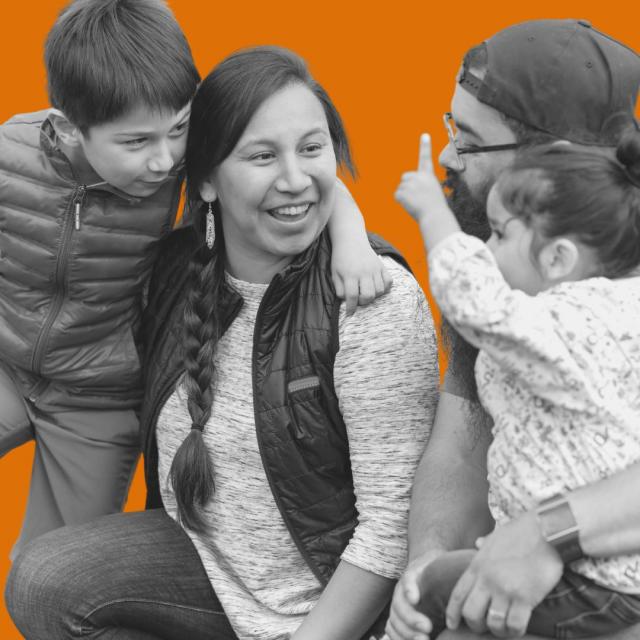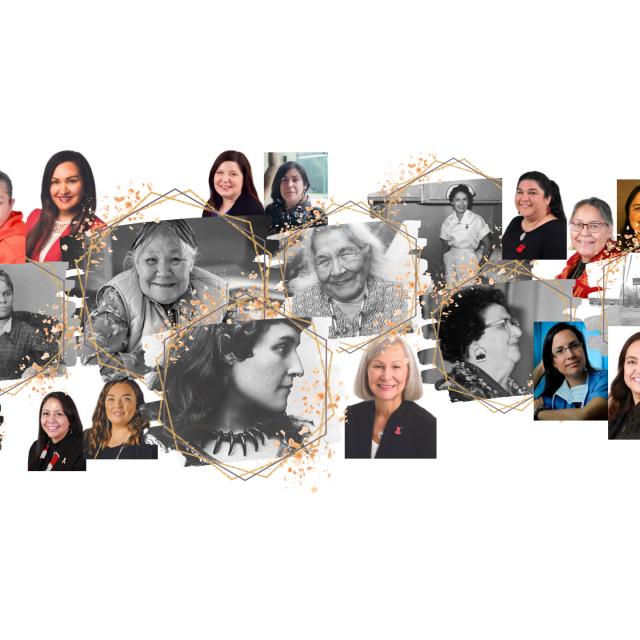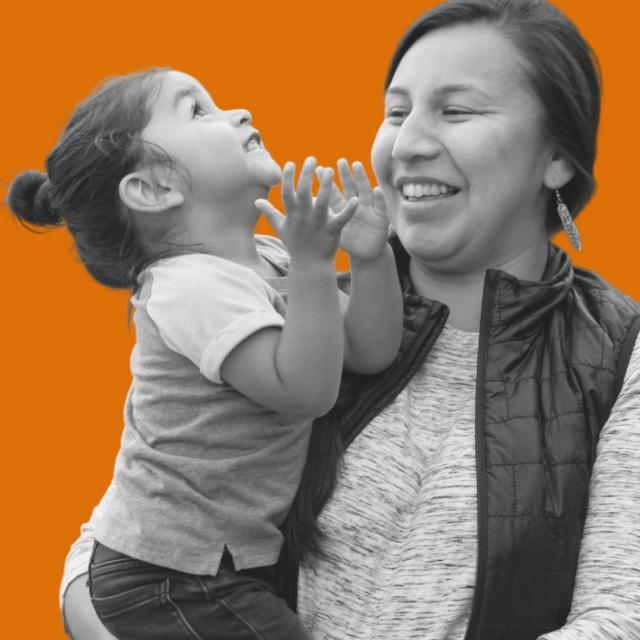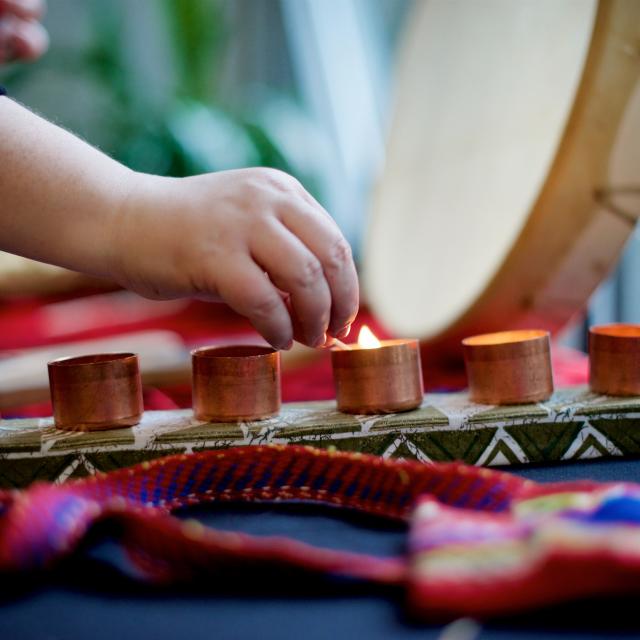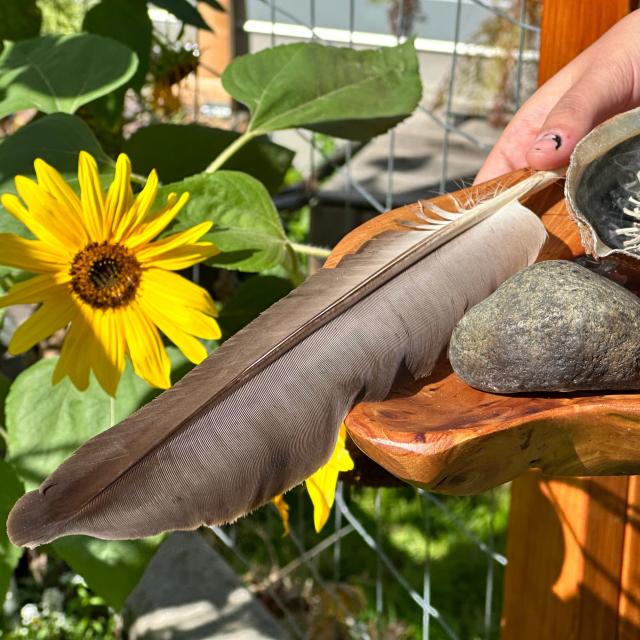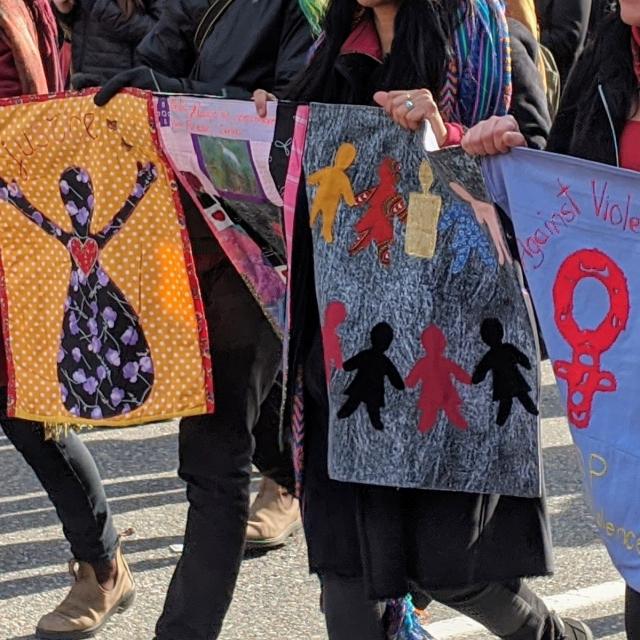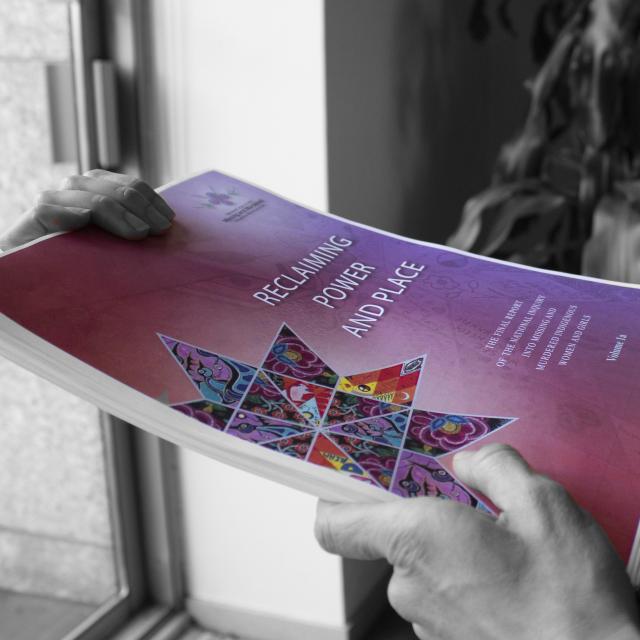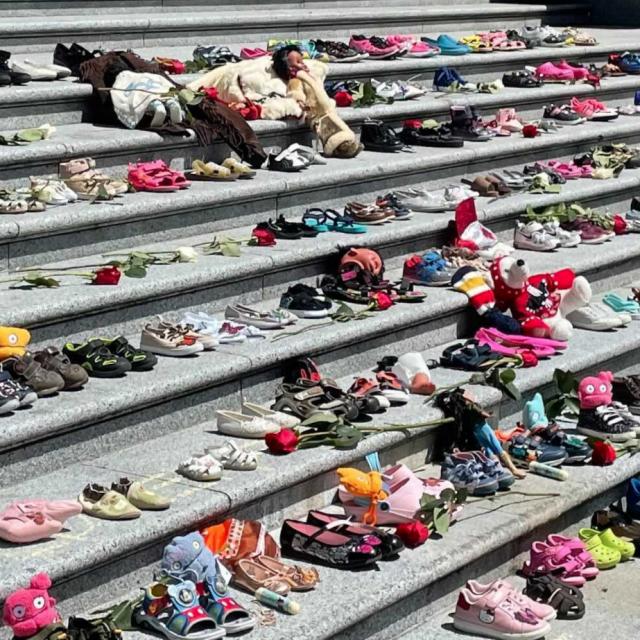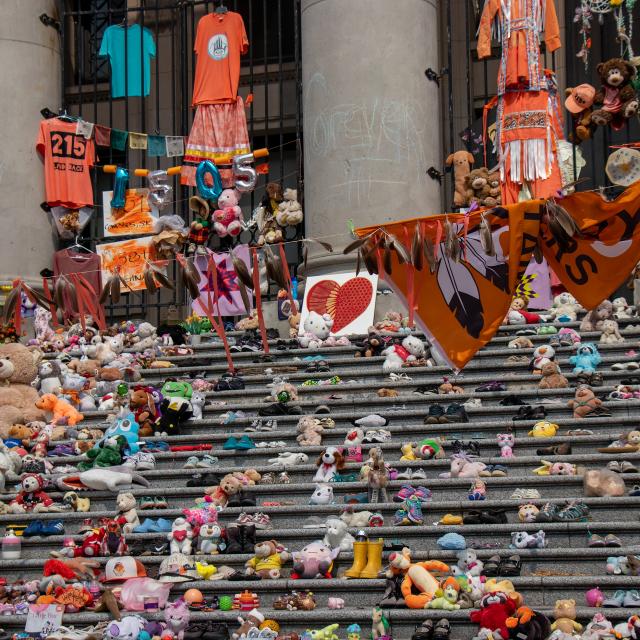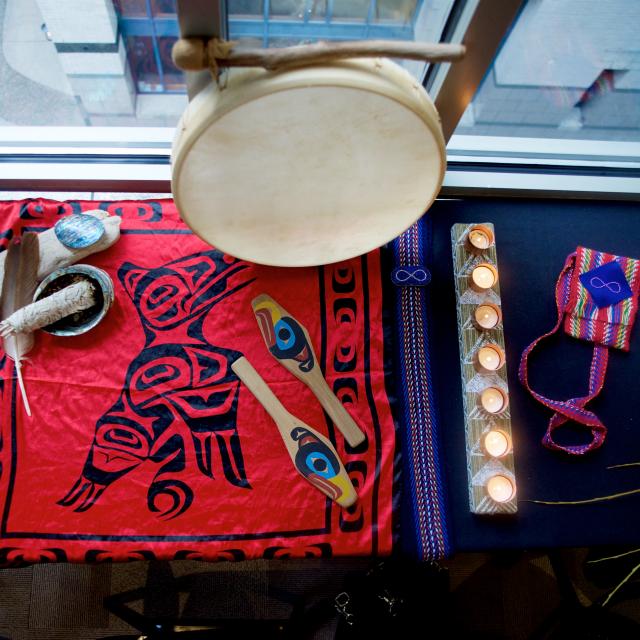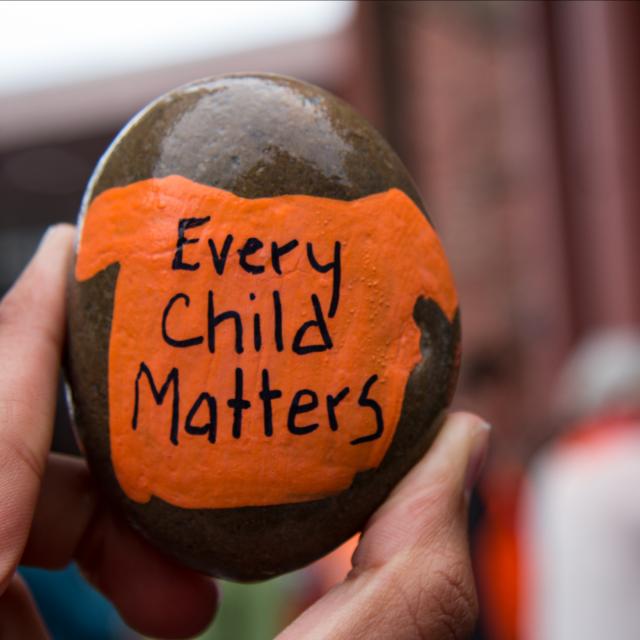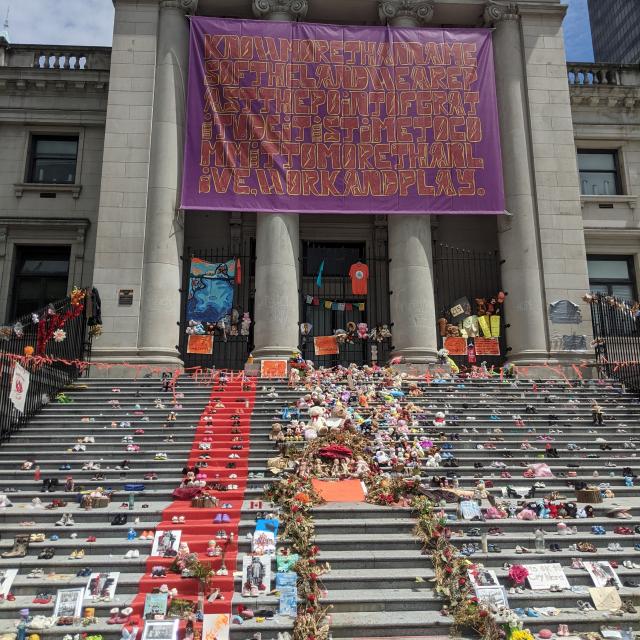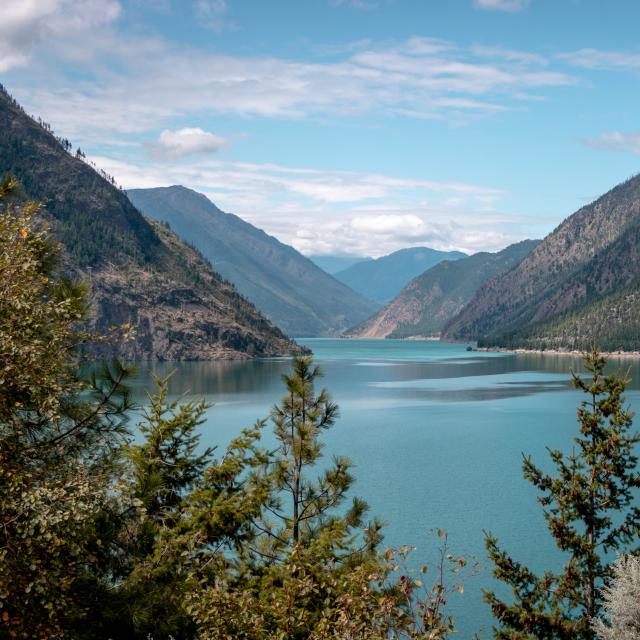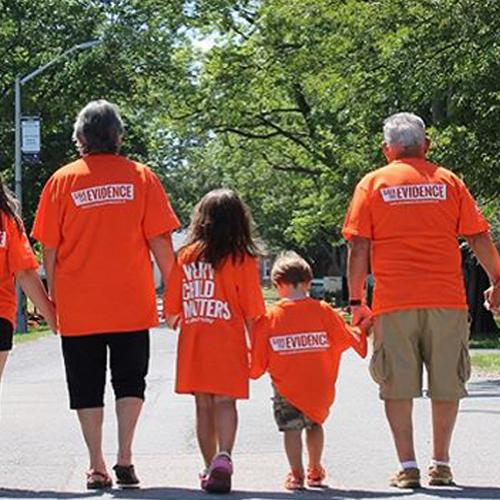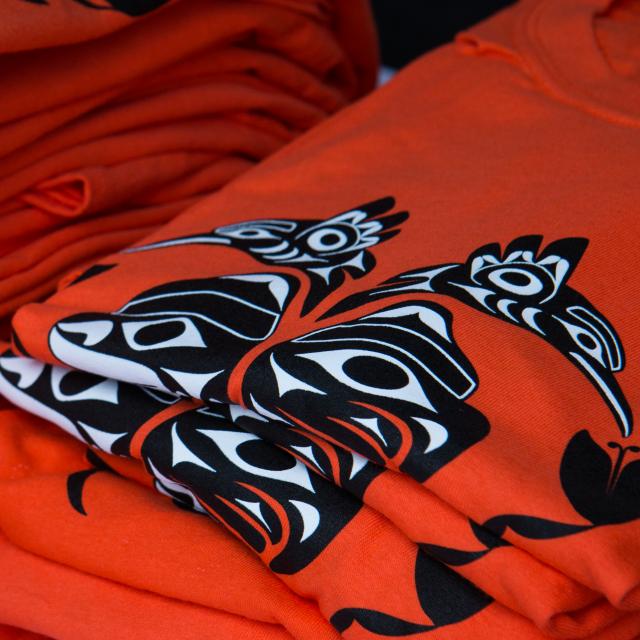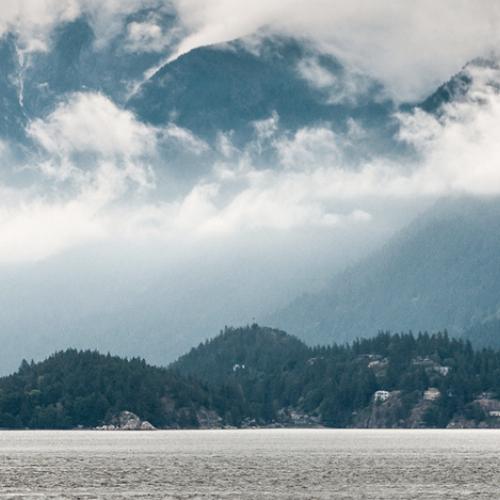
What You Can Do Today to Support Truth and Reconciliation
In June 2021, the federal government passed Bill C-5 to allow for the creation of the National Day for Truth and Reconciliation as a federal statutory holiday each September 30th. The day, also observed as Orange Shirt Day, is intended as a day for Canadians to spread awareness of and reflect on the tragedies experienced by Indigenous people as a result of the country's former residential school system and their lasting impacts.
Between the 1870s and the 1990s, approximately 150,000 Métis, Inuit and First Nations children were forced to attend residential schools, institutions established by Christian churches and the federal government to assimilate Indigenous children into Euro-Canadian society. These ‘schools’ were a means of cultural genocide, attempting to separate young Indigenous children from their cultural heritage and identities. Children were forcibly removed from their families, forbidden to speak their ancestral languages, disconnected from their culture and traditions, endured abuse and were forced to adopt Christianity in order to assimilate into Canadian society.
The truth of these heinous crimes was hidden from history books, and only recently have there been efforts to bring light to these actions, such as identifying unmarked graves of children who were at these schools. YWCA Metro Vancouver urges the federal government to take meaningful action toward reconciliation, including providing financial support for First Nations communities to access DNA testing that would enable Indigenous children to be properly repatriated back to their ancestral homelands.
On this National Day for Truth and Reconciliation, we light our candles to remember the children that never made it back to their families and communities. We would also like to pay special homage to all living survivors and intergenerational survivors that attended the institutions of genocide known as residential schools.
As we face the harrowing past, there are ways to move forward in hope and solidarity. The National Day for Truth and Reconciliation is a day of remembrance for Indigenous people. For non-Indigenous folks, it is an opportunity to listen, learn and become better allies to Indigenous communities by taking actionable steps towards reconciliation.
As settlers, we are able to enjoy this beautiful land we now call home, and it’s up to each of us to gain awareness of the suffering that took place in the very recent past and that is still being experienced through generational trauma, as well as persisting systemic racism like that found in the child welfare system. As an exercise of awareness, use this resource to see what the closest residential school was to where you currently live: https://nctr.ca/memorial/
Here are 5 things you can do today to support Truth and Reconciliation:
1) Learn about the 94 Calls to Action in the Truth and Reconciliation report
From 2008 to 2015, a Truth and Reconciliation Commission came together in an effort to help repair the harm caused by the residential school system. The Commission released its Final Report in 2015.
The report shares the full, horrifying truth of the damage caused by the residential school system, and recommends 94 Calls to Action. These actionable policy recommendations are meant to dismantle systemic racism, to aid the healing process and to provide direction on how to build equity for Indigenous Peoples in Canada.
The Calls to Action can be broken down into two categories: Legacy, which includes the subcategories Child Welfare, Education, Language & Culture, Health and Justice, and Reconciliation.
Although there has been some progress in implementing the Calls to Action since 2015, it has been very slow. According to Beyond 94, a website that monitors progress on the Truth and Reconciliation Commission's 94 Calls to Action, as of July 26, 2022, only 13 have been fully implemented*:
- CTA #13 - Acknowledge that Aboriginal rights include Aboriginal language rights
- CTA #15 - Appoint an Aboriginal Languages Commissioner
- CTA #16 - Create university and college degree and diploma programs in Aboriginal languages
- CTA #39 - Collect and publish data on the criminal victimization of Aboriginal people
- CTA #41 - Appoint a public inquiry into the causes of, and remedies for, the disproportionate victimization of Aboriginal women and girls
- CTA #59 - Church parties to residential school settlement to educate congregations on why apologies are necessary
- CTA #70 - A national review of archival policies
- CTA #80 - Establish a National Day for Truth and Reconciliation as a statutory holiday
- CTA #83 - Canada Council for the Arts to establish a strategy for Indigenous and non-Indigenous artists to undertake collaborative projects
- CTA #84 - Restore and increase funding to the CBC/Radio-Canada to enable it to support reconciliation
- CTA #85 - Aboriginal Peoples Television Network to support reconciliation
- CTA #88 - Continued support for the North American Indigenous Games
- CTA #94 - Replace the Oath of Citizenship
*This information may differ from other sources, such as the Yellowhead Institute’s 2021 Status Update on the Calls to Action Accountability.
Based on Beyond 94’s tracking system, it took seven years to complete 13 Calls to Action – that means less than two Calls a year. At this pace, it would take another 43.5 years to implement the remaining 81.
How do we hold elected officials accountable?
Taking action can feel daunting, but there are ways to hold elected officials accountable to follow through on promises that address racism and discrimination. One way you can make a difference now is by emailing the government by using a template we have prepared as part of the Keep Families Together campaign.
2) Write your personal Territorial Acknowledgment
We may have learned about the lands we’re living and working on, and may even have recited territorial acknowledgments at events and gatherings. But do we truly understand the past, present and future of the place we are residing in? Have we taken the time to sit down and reflect on the historical harm and ongoing colonialism that is built into these spaces? Have we thought about our own relationship to the land, what brought us here, and how we’re currently participating in the community?
We invite you on this National Day of Truth and Reconciliation to learn about your own relationship to the lands you are on, and to deepen your commitment to reconciliation by writing out your own personal territorial acknowledgement.
Here are some things you can do to start:
-
Stop and think. Reflect on why you’re doing this, your intentions and your goals.
-
Do the work. Take the time to learn about the Indigenous People that these lands belong to. Learn about whose lands you’re on at https://native-land.ca/, and learn the correct pronunciations.
-
Acknowledge colonial history and ongoing impacts of colonialism. Use past, present and future tenses thoughtfully. Indigenous Peoples were here, are still here and will continue to be here. Use terms like colonization, settler, assimilation and stolen land to highlight colonialism that have caused harm to Indigenous communities.
-
Speak authentically. Your story is your own, as is your place within this history. Use your own background and your personal relationship with the land you’re occupying in your acknowledgment.
-
Reflect on your own personal path to reconciliation. What responsibilities do you have on these lands and how are you giving back?
-
Highlight the resilience, strength and contributions of Indigenous Peoples as historical stewards of the land
As mentioned by Native Governance Centre, “Land acknowledgments shouldn’t be grim. They should function as living celebrations of Indigenous communities. Ask yourself, ‘How am I leaving Indigenous people in a stronger, more empowered place because of this land acknowledgment?’”
3) Buy an orange shirt from Indigenous-owned organizations and designers
Wear an orange shirt on September 30th in the spirit of healing and reconciliation, and to show support for the every child matters movement. Look for an Indigenous supplier; if it’s not an Indigenous supplier, make sure that the design is not stolen and that 100% of the profits go to an Indigenous organization.
Here are some suggestions:
Turtle Lodge Trading Post - Official Orange Shirt Day merchandise with $8.00 per shirt going to the Orange Shirt Society and $2.00 being donated back to Indigenous communities.
South Island Crafts - $12.00 from each Every Child Matters shirt sale going to the Orange Shirt Society.
Victoria Orange Shirt Day - All proceeds of the sales of their orange shirts and related products go towards their annual Xe Xe Smun’ Eem Orange Shirt Day Ceremony, Residential School Survivors and the continuing year-round costs of raising awareness of the effects of Residential Schools.
Skwachàys Lodge - A unique Indigenous social enterprise that combines a boutique hotel with a street-level art gallery, that supports on-site housing and studio space for 24 Indigenous artists.
UNYA 'Every Child Matters' Fundraiser - 100% of the profits from your orange shirt will be donated to Urban Native Youth Association (UNYA).
Ungailli Clothing - Proceeds from Orange Shirt Day sales are donated to the Orange Shirt Society.
4) Support Indigenous-owned businesses
One form of tangible action you can take is to understand and participate in economic reconciliation. It encourages community prosperity over individual material wealth, which often comes at the expense of community relationships or the health of the physical environment. Economic reconciliation looks at material wealth through a generational and community lens, within the context of wellbeing, mental health and values. This holistic approach is consistent with the notion of "Namwayut – We Are All One.” Before contact with colonizers, Indigenous peoples had thriving cultures, economies, communities and governance structures. We all share the responsibility to ensure the continued advancements and prosperity of Indigenous peoples and cultures.
Please take some time to look through this resource to support some great local Indigenous businesses.
5) Attend an event on National Day for Truth and Reconciliation
Here are some events in and around Vancouver. We will be updating this list as more events are announced.
Orange Shirt Day at Trout Lake - Join Nisga’a Ts’amiks Vancouver Society to honour the lost children and survivors from the Indian Residential Schooling system. The program will feature a ceremony, stories, drumming, and songs. All are welcome to attend and participate.
National Day for Truth and Reconciliation - Spirit of the Children Society will host a pipe ceremony at Westminster Pier Park to honour the lost children and survivors of residential schools, their families and communities.
National Day for Truth and Reconciliation Healing Walk - Vancouver Career College’s Abbotsford campus will be hosting a healing walk followed by a BBQ so attendees can discuss the meaning of this national holiday and make new connections within the community.
National Day of Truth and Reconciliation - Port Moody Station Museum - On September 30th, the Port Moody Station Museum will be featuring three documentaries at 10am, 11am and 12:30pm.
Truth and Reconciliation Week 2022 - a national program open to all schools across Canada. This year, the theme is “Remembering the Children”.
Intergenerational March to commemorate Orange Shirt Day - Led by UBC Applied Science and Land and Food Systems. There are no fees or registration required.
On Truth and Reconciliation: Indigenous artist James Harry On September 30th join artist James Harry as he talks about his most recent piece for National Day for Truth and Reconciliation.
The Dance Centre: Jeanette Kotowich – Kisiskâciwan Join independent dance artist and choreographer of Nêhiyaw, Métis and mixed settler ancestry, Jeanette Kotowich as she performs a solo performance of a journey to one’s self.
Weaving our Story Towards Reconciliation In Port Coquitlam, Quatsino First Nation weaver Leonard Williams will teach members how to weave hearts with cedar, using traditional techniques.
Frozen River (nîkwatin sîpiy) Presented by Carousel Theatre for Young People presents Frozen River (nîkwatin sîpiy) – a poignant and powerful play about reconciliation
Resources and other reading
United Nations Declaration on the Rights of Indigenous Peoples
The United Nations Declaration on the Rights of Indigenous Peoples (UNDRIP) is an international instrument adopted by the United Nations on September 13, 2007, to enshrine (according to Article 43) the rights that “constitute the minimum standards for the survival, dignity and well-being of the indigenous peoples of the world.” The UNDRIP protects collective rights that may not be addressed in other human rights charters that emphasize individual rights, and it also safeguards the individual rights of Indigenous people. The Declaration is the product of almost 25 years of deliberation by U.N. member states and Indigenous groups.
Charity Village: 16 Resources to help Settlers Understand and Advance Indigenous Reconciliation
"It is the responsibility of every Canadian and every organization to work toward reconciliation. To move toward a better, more equitable future, it is imperative for Canadians to understand past and present injustices committed against Indigenous peoples and what needs to change."
INDIGENOUS SUPPORTS
We recognize that the Indigenous residential school system is a deeply emotional topic. For anyone who needs further support, here is a list of available resources:
-
Healing in Colour: Healing in Colour envisions a world where BIPOC have access to therapy that supports healing and liberation and provides a curated list of support resources.
Find an BIPOC therapist in your community
- First Nations, Métis & Inuit Hope for Wellness Help Line: If you’re experiencing emotional distress and want to talk, call the First Nations, Métis & Inuit Hope for Wellness Line on +1 855 242 3310. Available 24/7.
- NWAC Elder Support Line: If you’re experiencing emotional distress and want to talk, call the NWAC Elder Support Line on +1 888 664 7808. Available Monday-Friday 6am-8am PT and 10am-12pm PT.
- Elder Fran: For anyone connected with YWCA Crabtree Corner, Elder Fran is available Tuesdays and Thursdays, from 8:30am-3:30pm.
- The Indian Residential School Survivors Society (IRSSS) is available 24-hours a day for anyone experiencing pain or distress as a result of his or her Residential school experience. Call toll free: 1-800-721-0066.
- The KUU-US Crisis Line Society operates a 24-hour provincial Aboriginal Crisis line for: adults, elders and youth.
- Adult/Elder Crisis Line: 250-723-4050
- Child/Youth Crisis Line: 250-723-2040
- BC Wide Toll Free: 1800-KUU-US17 (1800-588-8717)
- Métis Crisis Line BC Toll Free: 1833-MétisBC (1833-638-4722)
Photo by Tandem X Visuals.
